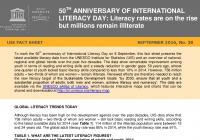Despite the steady rise in literacy rates over the past 50 years, there are still 758 million illiterate adults around the world, most of whom are women. These numbers produced by the UIS are a stark reminder of the work ahead to meet the Sustainable Development Goals (SDGs), especially Target 4.6 to ensure that all youth and most adults achieve literacy and numeracy by 2030.
Current literacy data are generally collected through population censuses or household surveys in which the head of the household answers one question: “Can you (and others in your household) read and write a simple sentence?” Some of the surveys ask adults to read a simple sentence, yet clearly literacy is a far more complex issue that requires more information.
For the UIS, the existing dataset serves as a placeholder for a new generation of indicators being developed with countries and partners under the umbrella of the Global Alliance to Monitor Learning (GAML).
GAML is developing the methodologies needed to gather more nuanced data and the tools required for their standardisation. In particular, the Alliance is finding ways to link existing large-scale assessments to produce comparable data to monitor the literacy skills of children, youth and adults. This involves close collaboration with a wide range of partners.
In particular, the UIS is working with the OECD, the UNESCO Institute for Lifelong Learning (UIL) and the World Bank to design and produce the Short Literacy Survey (SLS), a basic assessment of adult literacy. This will provide information on individual acquisition of very basic reading skills and will try to link to other international assessment scales, such as the Programme for the International Assessment of Adult Competencies (PIAAC) and the Skills Towards Employment and Productivity programme (STEP). By linking the three assessments, it will be possible to produce comparable data to better monitor adult literacy skills.
